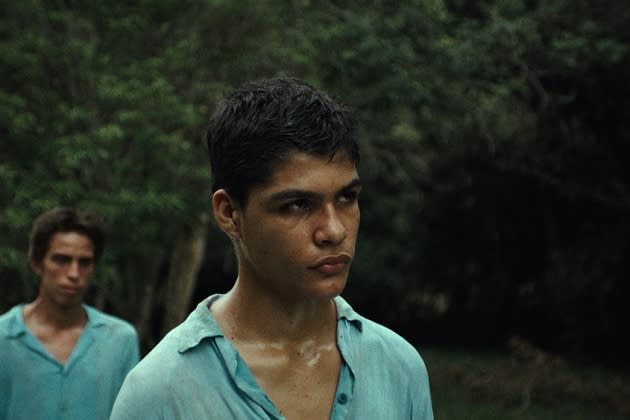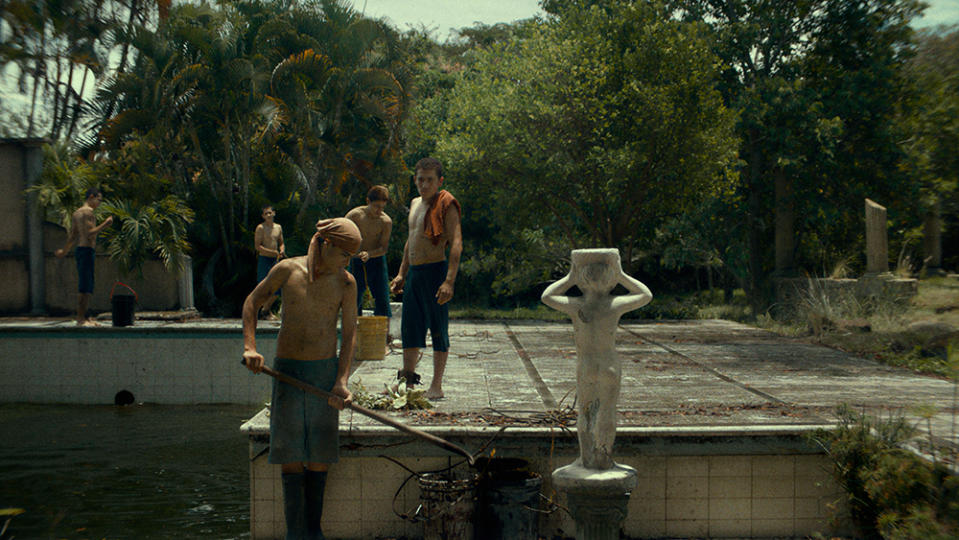Cannes Critics’ Week Winner ‘La Jauria’ Gets First Trailer (EXCLUSIVE)

After screening at the Toronto International Film Festival and coinciding with its San Sebastian bow, Variety has been granted exclusive access to the trailer for “La Jauria,” the first feature effort from award-winning Colombian director Andrés Ramírez Pulido (“El Edén”).
The film tracks the visceral journey of two estranged friends, Eliú (Jhojan Estiven Jimenez) and El Mono (Maicol Andrés Jimenez), who share an uneasy reunion after they’re sent to a remote and unconventional rehabilitation center to serve their sentence for a vicious crime. There, they grapple with accountability, moral fortitude and redemption. This raises questions about the unfettered nature of depravity looming in the thick, languid atmosphere.
More from Variety
Film Factory Snaps Up 'Mibu,' Opening Film at San Sebastian's Culinary Zinema Sidebar (EXCLUSIVE)
With Netflix Hit 'Intimacy,' Disney+'s 'Balenciaga,' Basque Country Founds Premium TV Sector
Produced by Jean-Etienne Brat & Lou Chicoteau at Paris-based Alta Rocca alongside Johana Agudelo Susa and Pulido’s Valiente Gracia, the plotline folds naturally into the scenery with visually haunting scenic textures that collide with ethereal sound.
“Since the writing of the script, we’ve tried to make the film not only heard and seen, but also felt,” said Pulido.
“Some of the elements that I decided to explore, from an aesthetic point of view, were the spatial and temporal “offscreen,” that’s where sound plays a very important role in my film, creating a captivating atmosphere that plunges the viewer into a new universe,” he added.
The trailer begins as a dilapidated pool, filled with debris, sits undisturbed. With a slow burn, the youth adorn the scenery like ornaments as they split their days between manual labor and meditation.
An oppressive and weighty climate is portrayed onscreen by furrowed brows, labored breathing and sweat that drips from every pore. The scenes are dark and eerily stagnant, largely taking place on the grounds of a neglected estate.
Eliú and El Mono navigate their discord. As one takes responsibility, trying to move forward from the atrocity, the other offers a glib reminder of the apathy it takes to commit such a crime in the first place.
The score is tethered to the sweeping unrest of the natural habitat holding the boys captive. From ethereal to foreboding, the raw sounds of insects, birds, and waterfalls are preserved, alluding to the themes that sit under the surface, away from small talk and discipline.

“Music is the bridge that leads to the invisible and the heavenly in the film. That’s why I worked on the original music with Pierre Desprat, he’s a very young and talented French musician,” Pulido commented.
“We discovered that through angelic voices and very low, deep sounds, we could evoke what happens not only within the characters, but what happens out of frame, that the spectator doesn’t see,” he added.
“El Jauria” screen at San Sebastian’s Horizontes Latino strand alongside 11 other projects, including Manuela Martelli’s Cannes hit “1976” and “Charcoal” by Carolina Markowicz. The film will continue to the Biarritz and Busan International Film Festivals. The primary cast is rounded out by Miguel Viera (Álvaro) and Diego Rincon (Godoy), with world sales handled by esteemed French outfit Pyramide Distribution (“Winter Boy”); Bogota-based Cine Colombia handles the film nationally.
Shying away from tackling societal roles in galvanizing delinquency, Pulido prods his characters to reveal their motivations and examine ingrained fortitude.
“One of the aesthetic decisions I made in the feature film was to move away from that hyperrealism expected in Latin American films that address social issues and, above all, marginal communities,” he said.
He went on, “It’s a film that could take place in any country in Latin America, and even in other tropical places in the world. I wanted to expand the story to a more universal level.”
The film won the top Grand Prix prize at Cannes Critics’ Week, making Pulido the first Colombian director to snag the accolade for an effort that dissects human nature within a profoundly jarring setting with no distraction. Pulido, championing these uneasy surroundings, captures the full spectrum of the human spirit as Eliú’s mind dives inward, reflecting on his true capacity for permanent betterment.
“I’m a man of faith, I believe in change. But, perhaps the change doesn’t belong to us, but comes from a touch of grace, from something beyond,” stated Pulido.
“For me, violence is implicit in human nature and goes beyond any political, social or economic context. That’s why I decided to focus the film on a dialogue towards the intimate, towards the depths of our nature. I wanted a film that would allow a dialogue between what the viewer sees and what’s inside. I think that’s where the real art happens.”
Best of Variety
The Best Pop Culture Halloween Costumes for 2022: From 'Top Gun' to 'Euphoria'
'The Sopranos' Gets the Funko Pop Treatment in New Collectibles Release
From 'The Sandman' to 'Blonde': Books Made Into Movies and TV Series That You Should Read
Sign up for Variety’s Newsletter. For the latest news, follow us on Facebook, Twitter, and Instagram.

